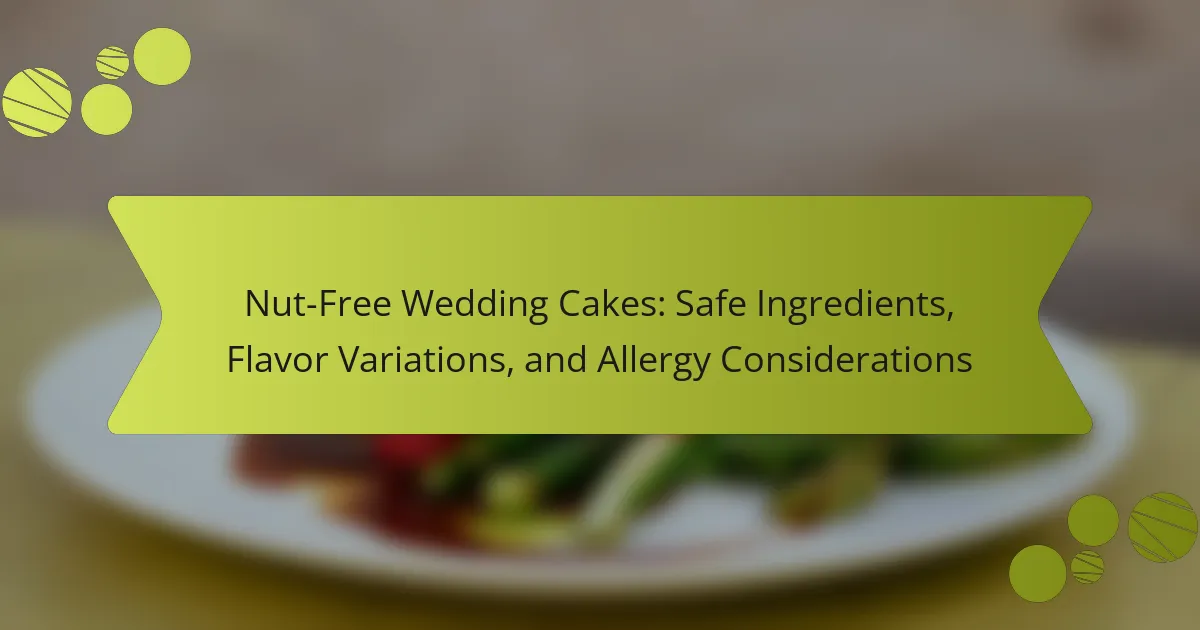Nut-free wedding cakes are specially crafted cakes that exclude all nut ingredients, catering to individuals with nut allergies and ensuring safe celebrations. The article outlines essential considerations for selecting a nut-free wedding cake, including the importance of verifying ingredients and avoiding cross-contamination in bakeries. It discusses common ingredients, flavor variations, and safe alternatives like seed butters and alternative flours. Couples are advised to communicate their nut-free needs to their chosen bakery, inquire about allergen practices, and consider tasting options to ensure satisfaction while prioritizing guest safety. This comprehensive guide emphasizes the significance of inclusivity at wedding celebrations through careful cake selection.

What are Nut-Free Wedding Cakes?
Nut-free wedding cakes are cakes specifically made without any nuts or nut-based ingredients. These cakes cater to individuals with nut allergies, ensuring safety during celebrations. Common ingredients include flour, sugar, eggs, and dairy. Flavor variations can range from vanilla to chocolate or fruit-infused options. Nut-free cakes can also incorporate safe alternatives like seed butters. Many bakeries offer nut-free options to accommodate dietary restrictions. It is crucial to confirm the absence of cross-contamination in kitchens. Nut-free wedding cakes ensure inclusivity for all guests at the celebration.
Why are Nut-Free Wedding Cakes important for some couples?
Nut-free wedding cakes are important for some couples because they ensure the safety of guests with nut allergies. Nut allergies can cause severe reactions, including anaphylaxis, which can be life-threatening. By choosing a nut-free cake, couples prioritize the well-being of their loved ones. This consideration reflects their commitment to inclusivity at their wedding. Additionally, nut-free cakes can cater to a wider audience, allowing more guests to enjoy the celebration. Many bakers offer delicious nut-free options that maintain flavor and texture. This choice also prevents potential cross-contamination in the kitchen. Overall, nut-free wedding cakes play a critical role in creating a safe and enjoyable environment for all attendees.
What are the common nut allergies that affect wedding cake choices?
Common nut allergies that affect wedding cake choices include almond, walnut, hazelnut, pecan, and cashew allergies. These allergies can lead to severe reactions in sensitive individuals. Almonds are often used in baking and can be present in cake batters or frostings. Walnuts and pecans may be included in cake recipes or as toppings. Hazelnuts are commonly found in certain flavorings and chocolate products. Cashews can also be used in cream fillings or frostings. Due to these potential allergens, many couples opt for nut-free alternatives to ensure guest safety. It is essential to communicate clearly with bakers about these allergies to avoid cross-contamination.
How do nut allergies impact wedding planning?
Nut allergies significantly impact wedding planning by necessitating careful ingredient selection and menu customization. Couples must ensure that all food options, including wedding cakes, are free from nuts. This precaution protects guests who may have severe allergic reactions. Venues and caterers need to be informed about these allergies to avoid cross-contamination. Invitations may include allergy notices to inform guests in advance. Additionally, alternative dessert options must be considered to accommodate guests with nut allergies. Research indicates that approximately 1-2% of the population has nut allergies, highlighting the importance of these considerations. Ensuring a safe environment enhances the overall wedding experience for everyone involved.
What are the key ingredients in Nut-Free Wedding Cakes?
The key ingredients in nut-free wedding cakes include flour, sugar, eggs, and dairy. Common flours used are all-purpose or cake flour. Sugar adds sweetness and structure. Eggs provide moisture and help bind the ingredients. Dairy, such as milk or butter, enhances flavor and texture. Additionally, vanilla extract is often included for flavoring. Baking powder serves as a leavening agent to create a light texture. These ingredients ensure that the cake is both delicious and safe for those with nut allergies.
What safe ingredients can be used in place of nuts?
Safe ingredients that can be used in place of nuts include seeds, such as sunflower or pumpkin seeds. These seeds provide a similar texture and nutritional profile. They are rich in healthy fats and proteins. Additionally, coconut flakes can be used for flavor and texture. They offer a sweet taste and can enhance the overall cake experience. Oats are another alternative, adding bulk and chewiness. They are gluten-free when certified, making them suitable for various dietary needs. Lastly, legumes like chickpeas can be ground into flour for a nut-free option. This flour is high in protein and fiber, making it a nutritious substitute.
How do these ingredients affect the taste and texture of the cake?
The ingredients in nut-free wedding cakes significantly influence both the taste and texture. For example, using almond extract can mimic the flavor profile of nuts without the allergens. This enhances the cake’s overall taste, providing depth and complexity.
Substituting traditional flours with alternatives like coconut or oat flour affects texture. Coconut flour absorbs more moisture, leading to a denser cake. In contrast, oat flour can create a lighter, fluffier texture.
Additionally, incorporating ingredients like applesauce or yogurt can add moisture, improving the cake’s softness. These elements contribute to a tender crumb, enhancing the overall mouthfeel.
The use of natural sweeteners, such as honey or maple syrup, can also modify taste. They provide unique flavor notes that differ from refined sugars. This variation can make the cake more appealing to different palates.
Overall, the careful selection of ingredients in nut-free wedding cakes directly impacts both flavor and texture, ensuring a delightful experience for all guests.
What flavor variations are available for Nut-Free Wedding Cakes?
Nut-free wedding cakes can come in a variety of flavor variations. Popular options include vanilla, chocolate, lemon, and red velvet. Other choices may feature flavors like carrot, coconut, or almond extract, which is typically safe if made without nuts. Specialty flavors can also include berry blends, such as raspberry or strawberry. Each flavor can be paired with corresponding frostings, such as cream cheese or buttercream. Many bakers offer customizable options to suit individual preferences. These variations ensure that nut-free wedding cakes remain delicious and appealing for all guests.
What are popular flavor options for nut-free cakes?
Popular flavor options for nut-free cakes include vanilla, chocolate, lemon, and red velvet. Vanilla is a classic choice that appeals to many. Chocolate provides a rich and indulgent flavor. Lemon adds a refreshing citrus twist. Red velvet offers a unique taste and striking color. These flavors are widely enjoyed and can be made without nuts. They are safe for individuals with nut allergies, making them suitable for various occasions.
How can couples customize flavors while ensuring safety?
Couples can customize flavors in nut-free wedding cakes by selecting safe ingredients and avoiding allergens. They should choose flavorings and extracts that are certified nut-free. Using fresh fruits, vanilla, or spices can enhance flavors without compromising safety. Couples must also communicate with their baker about specific allergies and preferences. It is essential to verify that all ingredients are sourced from reputable suppliers. Additionally, conducting a taste test ensures the desired flavor profile while maintaining safety standards. Following these steps helps couples create a personalized cake that is both delicious and safe for all guests.

How can couples ensure their wedding cake is truly nut-free?
Couples can ensure their wedding cake is truly nut-free by choosing a reputable bakery that specializes in allergy-friendly cakes. They should communicate their nut-free requirement clearly to the baker. Couples must inquire about the bakery’s practices to avoid cross-contamination. This includes asking if the kitchen is nut-free and if separate equipment is used. They should also request a list of all ingredients used in the cake. Couples can consider using pre-packaged, certified nut-free ingredients. Additionally, they can opt for cakes made with alternative flours, such as rice or coconut flour, which are naturally nut-free. Verifying the labels of all components, including frosting and decorations, is essential. By following these steps, couples can significantly reduce the risk of nuts being present in their wedding cake.
What precautions should be taken when ordering a Nut-Free Wedding Cake?
When ordering a nut-free wedding cake, ensure the bakery is certified nut-free. This certification indicates that the bakery has strict protocols to avoid cross-contamination. Communicate clearly about the nut allergy to the staff. Provide detailed information about the severity of the allergy. Request a list of all ingredients used in the cake. Verify that all components, including fillings and decorations, are nut-free. Consider ordering a cake that is made in a dedicated nut-free facility. Always confirm the bakery’s procedures for handling and preparing nut-free cakes. These steps minimize the risk of allergic reactions during the event.
How can couples verify the bakery’s nut-free practices?
Couples can verify a bakery’s nut-free practices by directly asking the bakery about their policies. They should inquire if the bakery has a dedicated nut-free facility. Couples can also request to see ingredient labels for all products used. Additionally, checking if the bakery has experience in handling nut allergies is crucial. Reviews and testimonials from previous customers can provide insight into the bakery’s practices. Couples may also ask for written assurances regarding the absence of cross-contamination. Finally, visiting the bakery in person can help assess cleanliness and safety measures.
What questions should couples ask their cake designer?
Couples should ask their cake designer about ingredient safety, specifically regarding nut allergies. They should inquire if the kitchen is nut-free to avoid cross-contamination. Couples should also ask about the sourcing of ingredients to ensure they are safe for guests with allergies. It is crucial to discuss flavor options that are nut-free and any potential substitutes. Couples should request a detailed list of all ingredients used in the cake. They should confirm if the cake designer can accommodate specific dietary restrictions. Additionally, couples should ask about the designer’s experience with nut-free cakes. Finally, they should discuss the delivery and setup process to ensure the cake remains safe until served.
What are the potential cross-contamination risks with Nut-Free Wedding Cakes?
Nut-free wedding cakes can still pose cross-contamination risks. These risks arise from shared kitchen equipment and surfaces. If utensils or mixers used for nut-containing items are not properly cleaned, traces can remain. Additionally, flour and other ingredients may be processed in facilities that handle nuts. This can lead to unintentional contamination. According to the Food Allergy Research and Education (FARE), even small amounts of nuts can trigger allergic reactions. Therefore, it’s crucial to ensure dedicated preparation areas and equipment. This minimizes the risk of cross-contamination for nut-free cakes.
How can cross-contamination be avoided during preparation and serving?
Cross-contamination can be avoided during preparation and serving by implementing strict hygiene practices. Use separate utensils, cutting boards, and equipment for nut-free ingredients. Clean surfaces and tools thoroughly before and after use. Store nut-free ingredients in clearly labeled containers to prevent mix-ups. Wash hands frequently, especially after handling potential allergens. Train staff on allergen awareness and safe food handling procedures. Following these practices significantly reduces the risk of cross-contamination, ensuring safety for those with nut allergies.
What are the signs of cross-contamination to look out for?
Signs of cross-contamination include the presence of allergenic ingredients in non-allergenic foods. This can occur through shared utensils or cutting boards. Visual contamination may also be evident, such as nut residue on surfaces. Additionally, food that has been in contact with allergenic items can lead to potential risks. The Food Allergy Research and Education (FARE) states that even trace amounts of allergens can trigger reactions. Therefore, vigilance in food preparation is crucial to ensure safety for those with allergies.

What are some tips for selecting and enjoying Nut-Free Wedding Cakes?
Select a nut-free wedding cake by confirming all ingredients are certified nut-free. Check with the baker about cross-contamination risks. Choose flavors that traditionally do not include nuts, such as vanilla or chocolate. Consider alternative flours, like almond flour substitutes, to ensure safety. Request a tasting to assess flavor and texture. Look for bakeries specializing in allergen-free cakes for expertise. Read reviews from other customers with similar dietary needs for reassurance. Enjoy the cake by pairing it with nut-free accompaniments, like fresh fruit or dairy-free ice cream.
How can couples choose the best Nut-Free Wedding Cake for their needs?
Couples can choose the best nut-free wedding cake by prioritizing ingredients and flavor preferences. First, they should communicate dietary restrictions to the baker. This ensures that all ingredients are nut-free and safe for guests with allergies. Next, couples should sample various cake flavors to find their preferred taste. Popular nut-free options include vanilla, chocolate, and red velvet.
Additionally, couples should inquire about the bakery’s practices to avoid cross-contamination. A reputable bakery will have protocols in place to prevent nut exposure. They can also consider custom designs that reflect their wedding theme while remaining nut-free.
Finally, reading reviews and asking for recommendations can help couples find trusted bakeries specializing in nut-free cakes. This approach ensures a delicious and safe wedding cake for everyone.
What factors should be considered when tasting and selecting flavors?
When tasting and selecting flavors for nut-free wedding cakes, consider the balance of sweetness and acidity. This balance affects overall flavor perception. Analyze flavor intensity to ensure it complements other ingredients. Evaluate texture, as it influences mouthfeel and enjoyment. Consider dietary restrictions, ensuring flavors are safe for all guests. Assess seasonal availability of ingredients for freshness and taste. Explore flavor pairings that enhance the cake’s profile. Finally, gather feedback from a diverse group to ensure broad appeal.
How can couples ensure their guests enjoy the cake without worry?
Couples can ensure their guests enjoy the cake without worry by selecting nut-free ingredients. This prevents allergic reactions among guests with nut allergies. They should communicate with their baker about specific dietary needs. Providing clear labeling on the cake is essential. Couples can also offer alternative desserts for guests with allergies. Encouraging guests to inform them about allergies in advance can help. Using certified nut-free products adds an extra layer of safety. Couples should consider consulting with an allergist for further guidance.
What are some common troubleshooting tips for Nut-Free Wedding Cakes?
Common troubleshooting tips for nut-free wedding cakes include ensuring proper ingredient substitution. Use nut-free flours like rice or oat flour to maintain texture. Monitor baking times carefully, as nut-free cakes may bake faster. Check for moisture, as nut-free cakes can dry out quickly. Use simple syrups to add moisture if needed. Ensure cross-contamination is avoided by using clean tools and surfaces. Test the cake for doneness with a toothpick; it should come out clean. Lastly, refrigerate or freeze leftovers promptly to maintain freshness.
How can couples address unexpected issues with their cake on the wedding day?
Couples can address unexpected issues with their wedding cake by having a contingency plan. This plan should include contacting the baker for immediate assistance. Couples should also have a backup cake or dessert option available. Keeping a list of emergency contacts can expedite problem resolution. Additionally, couples can inform their wedding planner about any cake-related concerns. This ensures that someone is prepared to handle issues on the spot. Having a designated area for the cake can prevent accidents. Lastly, couples should communicate with guests about allergies to avoid health risks.
What should couples do if they discover a nut allergy among guests last minute?
Couples should immediately communicate with their catering team about the nut allergy. Informing the caterers allows them to adjust the menu accordingly. They should also identify all dishes that may contain nuts. This includes appetizers, main courses, and desserts. Couples can consider offering a separate nut-free dessert option. It’s essential to label all food items clearly to prevent any accidental exposure. Additionally, couples should inform guests about the nut-free options available. This proactive approach ensures the safety and comfort of all guests.
Nut-free wedding cakes are specially crafted cakes that exclude all nuts and nut-based ingredients, ensuring the safety of guests with nut allergies during celebrations. This article explores the importance of nut-free cakes for couples, common nut allergies affecting cake choices, key ingredients, flavor variations, and safe alternatives to nuts. It also addresses the precautions necessary to prevent cross-contamination, tips for selecting and customizing cakes, and troubleshooting strategies for unexpected issues. By prioritizing inclusivity and safety, couples can create a memorable wedding experience for all attendees.
